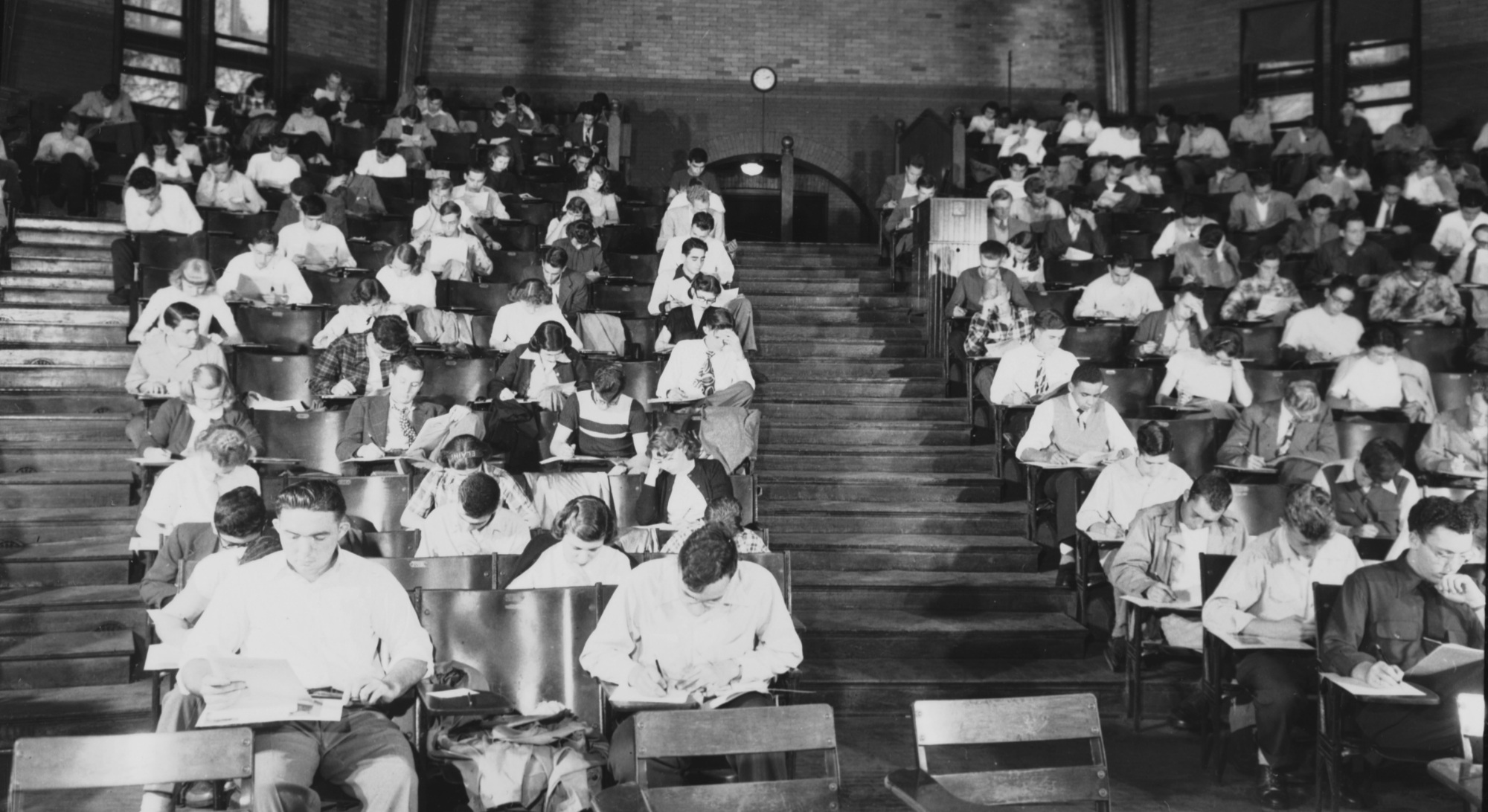
Even in a large lecture hall, “you can see each and every person perfectly,” says Matthew Brady, AB’87, PhD’94, associate professor of medicine. “You can see who’s talking, who’s dozing, who’s on their phone. I had always assumed you were hidden in the crowd.” (Photography by Vories Fisher, LAB 1918, PhB 1922; UChicago Photographic Archive, apf4-01890, UChicago Library)
Once they were College students. Now they are faculty. What have they learned?
UChicago phenotype
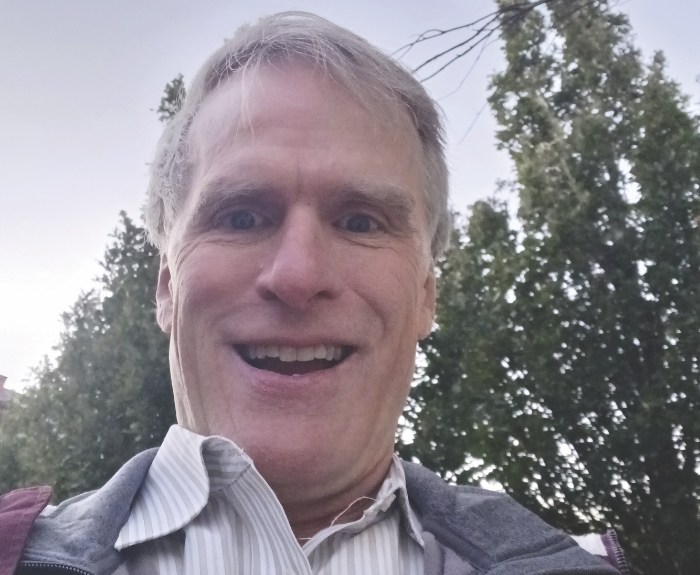
Matthew Brady, AB’87, PhD’94, associate professor of medicine and chair of the Committee on Molecular Metabolism and Nutrition, won the Quantrell Award for Excellence in Undergraduate Teaching in 2007.
Dorm: Burton Judson
Clubs: Intramural sports. “Our coed Ultimate Frisbee team won several undergrad championships.”
Sartorial style as an undergrad: “J. Crew.” At an Erasure concert at the Riviera, Brady and his friends wore “pink and blue and yellow. Everybody else was in black.”
Major: Biology. “I was going to become a virologist, until I took a virology class with a lab and hated it. Intellectually, virology fascinated me, but the practical aspect was not for me.”
First impressions of UChicago: “Horrible. When I visited, I stayed in Woodward, where the B-school [Chicago Booth’s Harper Center] is now. Thankfully, they tore it down. My host was overtly telling me not to come here. There was some issue with my visit, so I had to pay for my own cot, I had to pay for my own food. This was before ATMs. So when I got back to LaGuardia, I did not have the cash to get home. I had to call my mother to come pick me up. But I loved the biochem class I sat in on. Intellectually, it was a home run.”
On the Core curriculum: “During college, I was kind of annoyed. I took two years of HUM, two years of SOSC, two quarters of art and music, foreign language. But after I graduated, I became an adamant supporter of the Core. I realized I never would have read Machiavelli on my own.”
Memorable moment: “In the Winter Quarter, organic chemistry was taught Tuesday, Thursday, Saturday for an hour and a half. I am not making this up. We were in the big auditorium in Kent. In one Saturday class, this student with a varsity football jacket on raises his hand and asks a question. I didn’t even understand the question. The professor goes, ‘Excellent point!’ and gets really excited and starts writing on the board. I’m like, ‘Oh man, if I can’t even beat the varsity football player, I give up.’”
The view from the other side of the lectern: “I’ve had over 100 students in the first-floor BSLC [Biological Sciences Learning Center] rooms, and you can see each and every person perfectly. You can see who’s talking, who’s dozing, who’s on their phone. I had always assumed you were hidden in the crowd.
“During the pandemic, I realized how much I depend on the students’ eyes while I’m lecturing. Are they with me, or am I losing them?”
How the College experience shaped your teaching: “I remember being stressed before my first lecture. So I thought, what could I emulate about the teachers that I most loved? One thing is enthusiasm. So I tell my students—half of it is salesmanship—‘This has got to be some of the coolest stuff that we’re going to go over.’ And then there’s organization and being clear. I took a course with Ted Steck [Professor Emeritus, Biochemistry and Molecular Biology] where I was writing for 50 minutes straight, but it was so clear. Everything he said made sense.
“I really enjoy teaching. We used to joke you have to get funded so you can teach, because there’s such a strong emphasis on research funding. And now teaching seems to be coming more to the fore.”
If students know you’re an alum: “I tell them I went here as an undergrad, so I get it. At the first midterm, you think you have this class under control, so you put it on the back burner. But I warn them, it’s going to pick up.”
If College students are the same or different: “There is still a U of C phenotype.”
Quirky intellectual UChicago of the ’90s
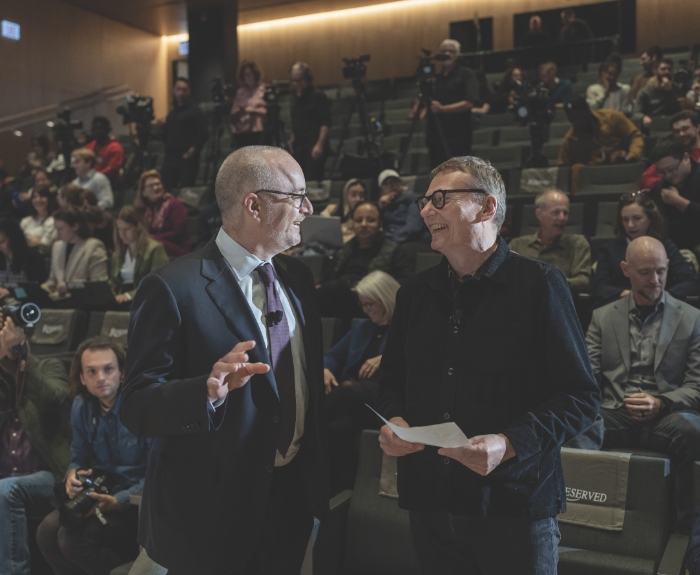
Ethan Bueno de Mesquita, AB’96, Sydney Stein Professor, is dean of the Harris School of Public Policy.
Dorm: Woodward. “It was lousy. Cinder block and very, very hot. I loved it. I made good friends there.”
First impressions of UChicago: “I did not anticipate the gothicness.”
Clubs: Orchestra (violin, viola), band (guitar), Hillel, Nightline (a student-run, late-night support hotline).
Sartorial style as an undergrad: “Slovenly.”
Major: Political science. “I was a dilettante. Political science did not have a ton of required classes and would accept a bunch of econ and philosophy and math. My adviser was like, ‘Take one more political science class, and you, my friend, are a political science major.’”
Memorable moment: “In the early ’90s, the way registration worked for first-years was, you would go in person, and they would randomly open and close classes, to make it fair. While I was in the middle of registering, they yelled out, ‘All sections of HBC [Human Being and Citizen] are now open. Get Amy Kass [AB’62] while you can.’
“I didn’t know what that meant, but it sounded like advice, so I took it. I had Amy Kass for HBC the whole of my first year, and she was a magical teacher. The most important class I took as an undergrad.”
What it’s like to be back: “It was surreal at first. I would walk around campus and be flooded by memories of me as a 19-year-old. My first or second year back, I went to some University-wide meeting where five faculty members had been asked to talk. I realized I had taken a class with every single one.”
How the College experience shaped your teaching: “To my detriment, it didn’t enough. When I think back to the classes I took with teachers who were really effective, I see they were doing things that I now know to do.
“Amy Kass, at the beginning of every single class, would take out her notepad and read back her summary of our discussion from the week before—who had said what, then who had said what in response. But she was also putting a gloss on it. She was turning a scattered conversation into a story, to remind you of the learning goal from last time, and to set up the learning goal for this time.”
Teacher of teachers: “Before I became dean, I taught a course in political economy for 15 years. When you’ve taught a class that many times, you’ve heard the same conversation over and over. So when a student asks a question, you understand not only the question, but also the underlying confusion, and what some of the responses are going to be. You can let the discussion go for a while, because you know exactly where it’s going. As clever as an 18-year-old at UChicago feels like they are, you’ve heard it all.
“I can look back now and see the great teachers I had were doing just that—letting the discussion go, then reining it in. I can appreciate the craft.”
What’s changed in the College: More preprofessional majors, including public policy. “It’s a good major—that I never would have done. I was not thinking about my career at all. I was oblivious.
“I loved the quirky intellectual UChicago of the ’90s. But when I went to my 25th reunion, a lot of my classmates told me they left the College feeling adrift. It took them a few years to figure out their careers. Undergrads today experience much less of that.”
If students know you’re an alum: “I’m not covert about it. But I don’t know if students know.”
Ragtag bunch of misfits
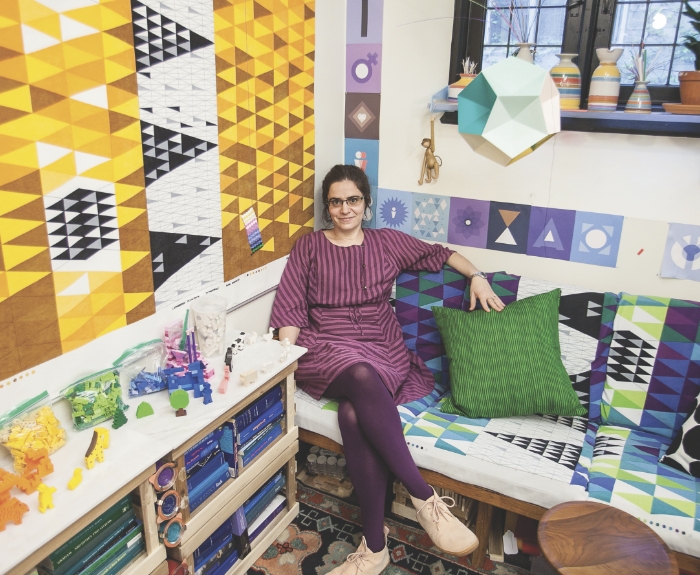
Agnes Callard, AB’97, associate professor in the Department of Philosophy, won the Quantrell Award for Excellence in Undergraduate Teaching in 2017.
Dorm: Burton Judson
Major: Fundamentals, though she had intended to study physics: “In high school I didn’t have the sense there was such a thing as truth in the humanities. In HBC [Human Being and Citizen] I realized there are truths here, too, and they’re way more interesting.”
Sartorial style as an undergrad: Colorful plaid shirts, red-and-white suede platform shoes, a “jester hat.”
Clubs: Attended one meeting of the debate team.
“Towards the end of my first year, I got a little note in my mailbox. It said, come to a certain location and ‘dress regally.’ It was just some guy who picked out five people he thought were interesting and created a little intellectual group. I’m still friends with those people.”
Memorable moments: “We found a way to get up on the roof near Classics. This was not somewhere you were supposed to go. It was snowing, and it was just really beautiful.
“But most of my best times were in classes with Amy Kass [AB’62] and her husband, Leon Kass [LAB’54, SB’58, MD’62]. I felt like something momentous was happening. Like it really mattered what I thought and what kind of progress the class made in answering a question.”
How the College experience shaped you: “At the time there was a gym requirement. I didn’t believe the University was actually going to make me do it. The spring quarter of my senior year, I had to take intensive gym—three quarters smooshed into one.
When I showed up the first day, every face looked sullen and resentful and angry. It was also at eight in the morning. I was revolted by the thought that I was exactly like the rest of them. So I decided, I’m going to learn about the value of exercise. And I did. I started running, and in grad school I got really into long-distance biking, and I joined the cycling team.”
On returning to UChicago as a professor: “I went to grad school at Berkeley, and there were a bunch of different jobs. I went to my adviser and said, ‘You see this University of Chicago job? That’s my job.’ And he was like, ‘Okay. So that’s not the way it goes.’”Reasons to envy today’s College students: “They get to take classes, and I don’t. In fact, I’m so envious that, actually, I do. Last quarter I took an undergrad class on Foucault. I learned so much. I’ve resolved to sit in on at least one class a year, maybe two.”
How the College shaped your teaching: “I have two teaching ideals. The small-discussion ideal is Amy Kass. She took everything everyone said so seriously, as though it could really be the answer to the question that she asked.
“The lecture ideal is Robert Pippin [Evelyn Stefansson Nef Distinguished Service Professor, John U. Nef Committee on Social Thought], who is still here. The way Robert taught, say, Kant, is he made it intelligible, while retaining all the complexity. And he never said it the same way twice. He had this ability to let you see a million different sides of the same point and let you grip it.
“They’re still my ideals. I’m doing little imitative hacks.”
If College students are the same or different: “When I was here, it was a little more like a ragtag bunch of misfits.”
Reading novels in bed during winter
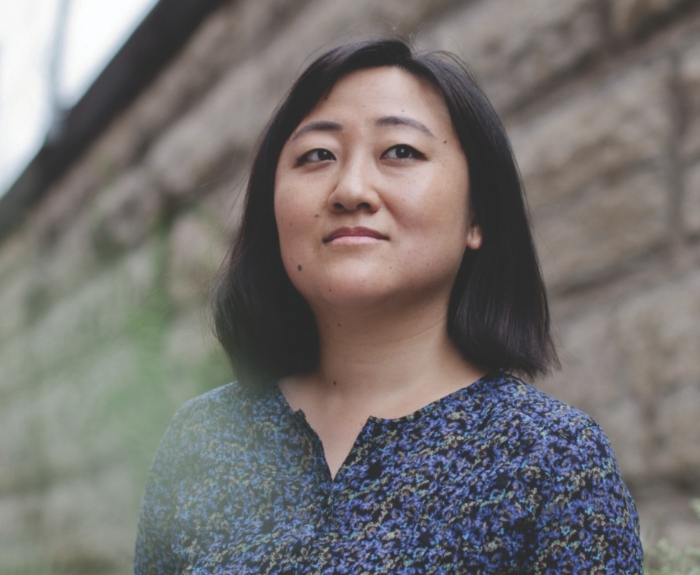
Ling Ma, AB’05, is associate professor in the Department of English Language and Literature (anticipated return July 1, 2025). The author of the 2018 novel Severance and the 2022 story collection Bliss Montage, Ma was awarded a MacArthur Fellowship in 2024. This interview was conducted over email.
Dorm: Broadview (RIP). I chose it because it was a bit further away from campus, and it was one of the few dorms that offered more single rooms. At night, my friend and I would smoke clove cigarettes in the ballroom, where smoking was still allowed. (RIP Djarum cigarettes …)
Clubs/activities: I dabbled in a few things. I was briefly involved with Euphony [literary journal] and Fire Escape Films. I wrote exactly one article for The Maroon. And I attended an Elliott Smith vigil after he passed. For income, I worked 10 hours per week at the Reg shelving books, though I usually canceled a shift every week.
Major: I had the intention of focusing on anthro, but I ended up with a concentration in English. I majored in what came easiest to me: reading novels in bed during winter. And of course, I was able to take many creative writing courses as an English major. Sartorial style as an undergrad: I wore a random mishmash of things I found at secondhand shops. I remember I had a tweed blazer from this vintage shop, Land of the Lost on Belmont, that I was very fond of. From what I remember, on campus the aspirational style at the time was Anna Karina in Godard films. I too went through a Godard phase.
First impressions of UChicago: I was very intimidated. In my first month, I had a panic attack and thought about dropping out. But I stuck it out.
The high school transition: Beyond taking classes, I simply had too little practical knowledge of living on my own. I had never used a gas stove. I thought it was fine to put my sneakers in the washer. But I learned quickly.
How the College shaped your teaching: I think I have an understanding of the kind of stress the students are under, especially now that the term has been reduced from 10 to 9 weeks.
Reasons to envy today’s College students: I’m not so much envious of what current students have. It’s just that I wouldn’t mind being a student again and taking some of the courses I see in the catalog.
What was better then: Hard to say what’s better or worse. All I can say is,I miss my college friends. And the free time. I didn’t understand I had a lot of free time back then.
If College students are the same or different: When I first started teaching as a lecturer, in 2017, the students seemed much the same as when I had been a student. Over time, I have seen a wider range of personality types.
If students know you’re an alum: If the subject arises, I tell my students. It’s not a secret but maybe it’s not that pertinent either.
On coming back to UChicago: I had no inkling at the time that I would even end up in academia again. This institution is very familiar to me, and it has had a role in forming my intellectual life. I feel that I belong here.
Interviews have been edited and condensed.
